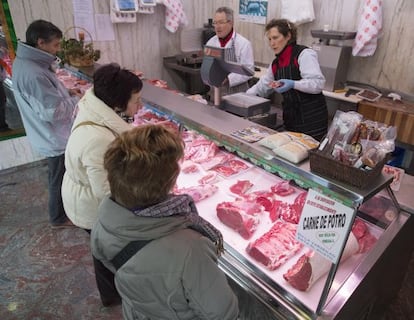Horsemeat sales grind to a halt
Labeling fraud puts the skids on burgeoning sub-sector of Spanish consumerism

The scandal over the horse meat found in products that were supposed to contain only beef has ruined the efforts of a small food sector that had grown 40 percent in 2012. The small-scale producers of certified horsemeat in Spain were placing 15,600 tons of it on the market a year, making it a residual business in a sector that handles over 19 billion euros annually.
In the last three years breeders from northern Spain had stopped selling all their livestock to Italy and started placing some of their products domestically. "It's a pity to see people who used to buy three or four kilos of minced horsemeat going back to beef," says Rosa del Val, owner of a butcher's shop in Burgos. "People are not well-informed. We know it's not a food-safety issue, but a labeling-fraud issue." These were the same words used on Thursday by Agriculture Minister Miguel Arias Cañete, who noted that horsemeat is perfectly healthy, but that some people's "sensitivity" may deter them from eating it.
"The market right now is in the east, domestically, and in Italy and France at the EU level. There is also a lot of room for improvement in the north of the [Iberian] peninsula," says Juan Díaz, manager of an Asturian meat industry association called Asincar. The largest specialized feeding centers and slaughterhouses are in Catalonia and Valencia.
Playing the exotic dish card
Although horsemeat is as Spanish as cow meat, it still sounds exotic to most Spaniards. Chefs admit that the organoleptic properties of horsemeat are hard to beat: it is healthy, it contains a lot of collagen and it is ideal for roasting or curing, they say.
So why is it not used more frequently in avant-garde dishes? The short answer is because of cultural prejudice on the part of Spanish diners, according to Asturian chef Nacho Manzano.
Nevertheless, last year he himself served a slab of sautéed and roasted horsemeat with hazelnut oil at his Casa Marcial restaurant in Arriondas.
"Acceptance of a food has to do with cultural issues," adds the famous Basque chef Andoni Luis Aduriz, owner of Mugaritz, which carries two Michelin stars. In Burgos, there are young chefs who are using the regional Hispano-Bréton species as a basis for horse dishes at their establishments.
At a restaurant called 24 de la Paloma, the maître d' prepares a horse-based steak tartare and a burger-like tapa also based on horsemeat.
Saúl Gómez, the chef at Blue Gallery, added it to his tasting menu three years ago and reports that clients accepted it "without any problems."
"It is very interesting to prepare it raw," he adds, serving up a horse tataki, a Japanese raw horse dish.
Down south, the greatest handicap to horsemeat consumption is that equines are viewed as humans companions. In Burgos, where there is more of a tradition, around 30 butchers and many restaurants offer horsemeat and horse-based dishes. It is beginning to emerge as a native type of food following an intensive promotional campaign that seeks to convince consumers of its nutritional benefits. Horses are raised for meat by 87 sustainable livestock raisers in Burgos' mountain areas. The province even has its own endangered species, the Hispano-Bretón.
But the popular scare over the meat-adulteration scandal has caused the Burgos slaughterhouse to grind to a halt. Food giant Campofrío "suggested" the move over fears that its products could be found to have traces of equine meat. Now, breeders and butchers have to drive their animals to Palencia, 100 kilometers away, which adds to the price.
In other regions like Aragon, Navarre, Asturias and the Basque Country, there are also concerted efforts to promote horsemeat. Ixone Fernández de Labastida, an anthropologist at the Basque Country University, believes that the European meat fraud will not affect people who consume horsemeat traditionally, but that it will make it more difficult for new consumers to enter the market.
"When you talk about horsemeat, people think about an old nag, but all that is history now. Horsemeat is a quality product," says Fernández, who wrote her dissertation on Basque horses and horsemeat. In order to overcome popular abhorrence for the meat, producers are organizing tastings, food fairs and talks. Famous chefs have introduced it into their dishes.
"You'd think eating this meat makes you a leper," says José Ramón Velilla, a breeder and horsemeat producer in Asturias. He sells his product online, and says his clients are very satisfied. "One family from Barcelona told me that, compared with horsemeat, the things they'd been eating before tasted like cardboard."
Tu suscripción se está usando en otro dispositivo
¿Quieres añadir otro usuario a tu suscripción?
Si continúas leyendo en este dispositivo, no se podrá leer en el otro.
FlechaTu suscripción se está usando en otro dispositivo y solo puedes acceder a EL PAÍS desde un dispositivo a la vez.
Si quieres compartir tu cuenta, cambia tu suscripción a la modalidad Premium, así podrás añadir otro usuario. Cada uno accederá con su propia cuenta de email, lo que os permitirá personalizar vuestra experiencia en EL PAÍS.
¿Tienes una suscripción de empresa? Accede aquí para contratar más cuentas.
En el caso de no saber quién está usando tu cuenta, te recomendamos cambiar tu contraseña aquí.
Si decides continuar compartiendo tu cuenta, este mensaje se mostrará en tu dispositivo y en el de la otra persona que está usando tu cuenta de forma indefinida, afectando a tu experiencia de lectura. Puedes consultar aquí los términos y condiciones de la suscripción digital.









































